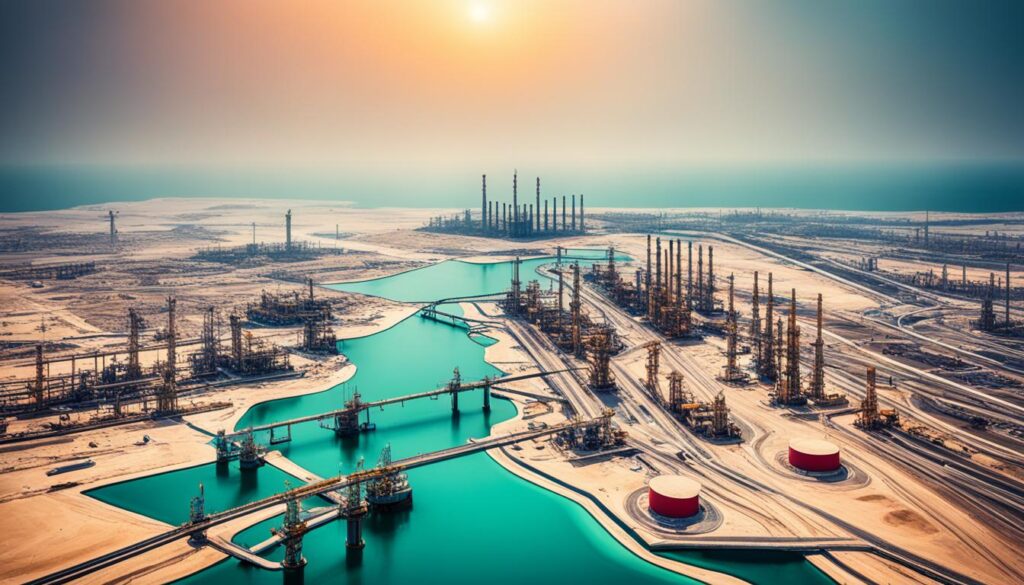The Arabian Gulf is key in world politics and the economy. This is because of its location and lots of oil. Gulf countries depend on oil sales for their plans. This sometimes causes tension with other countries. Knowing how the Gulf’s oil plans change is important for less conflict and world peace.
Saudi Arabia, Kuwait, and the UAE have big oil reserves. They are top oil producers. The Gulf has seen oil crises before, impacting worldwide energy and costs. As we aim for no carbon and more green energy, these countries face changes. They must shift from relying on oil without losing political and economic power.
Key Takeaways:
- Oil prices are influenced by Middle Eastern politics and geopolitical tensions in the region.
- The Gulf states, including Saudi Arabia, Kuwait, and the UAE, hold significant oil reserves and play a pivotal role in global energy supply.
- The transition towards renewable energy poses economic and political challenges for the Gulf states in decoupling from oil revenues.
- Understanding the complexities of Middle Eastern politics is crucial for analyzing the future of oil prices and its implications for the global economy.
- The Arabian Gulf region’s oil strategy has a direct impact on energy security, international stability, and global markets.
The Influence of Gulf Arab Countries’ Policies on Energy Security and Global Markets.
The policies inside and outside Gulf Arab countries like Bahrain, Kuwait, Oman, Qatar, Saudi Arabia, and the UAE deeply affect global energy security, international stability, and global markets. These nations hold a big part of the world’s oil and natural gas. Countries like Saudi Arabia, Kuwait, and the UAE play a big role in OPEC. Qatar is a big name in natural gas. The amount of oil reserves these countries have varies, with Saudi Arabia holding the most.
The Gulf region is crucial for global oil supply. It has been the center of many oil crises. The policies of Gulf states greatly influence energy supply shortages and global energy market stability.
“The actions of Gulf Arab countries shape the world’s energy outlook and affect economies everywhere. Their decisions on oil production, export quotas, and moves towards diverse energy sources impact the international market.”
Gulf Arab countries’ moves in energy policy and market strategies are watched closely. This is because their actions can sway energy prices, economic steadiness, and investment choices. Conflicts and diplomacy in the Gulf also directly impact the energy sector and worldwide markets.
The influence of Gulf Arab countries goes beyond oil and gas. As we move towards renewable energy and climate change mitigation, these nations are investing in cleaner energy options and diversifying their energy sources. How well they adapt to the global energy transition will decide their future economic and political standing.
Key Factors Influencing Gulf Arab Countries’ Energy Policies
Many factors shape the energy policies of Gulf Arab countries. These include:
- Energy security: Making sure energy supply is steady for both domestic and international needs.
- Economic development: Using oil and gas exports to fund different economic growth and social programs.
- Geopolitical considerations: Keeping a balance in regional and global relations and solving conflicts.
- Environmental concerns: Tackling climate change issues and moving towards sustainable energy.
- Technological advancements: Adopting new energy technologies like renewable sources and carbon capture.
Keeping an eye on Gulf Arab countries’ energy strategies helps understand the future of global energy markets. This means spotting possible risks and chances.
| Gulf Arab Country | Oil Reserves | Natural Gas Reserves |
|---|---|---|
| Saudi Arabia | 298.4 billion barrels | 9,223 billion cubic meters |
| Kuwait | 101.5 billion barrels | 1,278 billion cubic meters |
| UAE | 97.8 billion barrels | 6,091 billion cubic meters |
| Qatar | 25.2 billion barrels | 24,155 billion cubic meters |
| Bahrain* | 124.6 million barrels | – |
| Oman | 4.9 billion barrels | 1,000 billion cubic meters |
*Bahrain’s oil reserves are small compared to other Gulf countries.
The Gulf Arab countries are key in the global energy market due to their oil and gas reserves. Their decisions can affect energy prices, supply, and market steadiness.
The Evolution of Gulf Arab Oil Strategy in the Context of the Global Energy Transition.
Gulf Arab countries like Saudi Arabia, the UAE, and Kuwait are changing their oil strategies. They are dealing with the shift to net-zero carbon emissions and a sustainable energy future. These changes bring economic and political challenges as they move to cleaner energy.
These countries are starting to use sustainable energy more. They mix new clean energy tech with old oil systems. This mix helps grow renewable energy while still using fossil fuels.
By doing this, Gulf Arab nations keep their economies strong. Selling oil helps them make money for growth and social projects.
The International Energy Agency’s World Energy Outlook offers models for Gulf states’ oil plans. These models look at how policies and the market could affect oil in the region.
But, moving to greener energy and meeting climate goals is tough. These countries depend a lot on oil money for their budgets and big projects. Planning is crucial to break this dependence.
| Gulf Arab Oil Strategy | Global Energy Transition | Net-Zero Carbon Emissions | Economic and Political Challenges |
|---|---|---|---|
| Gulf Arab countries adopt a balanced approach, gradually transitioning towards sustainable energy sources. | The global energy transition presents challenges and opportunities for Gulf Arab nations. | Gulf Arab countries aim to reduce carbon emissions and contribute to global net-zero goals. | Economic diversification and political stability are key challenges in adapting to the changing energy landscape. |
| The integration of clean energy technologies complements existing hydrocarbon industrial systems. | The Gulf states recognize the need to invest in renewables while leveraging their fossil fuel resources. | Transitioning to more sustainable energy aligns with global climate objectives. | Decoupling oil revenues from economic growth poses significant economic and political challenges. |
| Monetizing oil assets supports domestic economies and social development initiatives. | The Gulf Arab countries’ oil strategies contribute to energy security and market stability. | Reducing carbon emissions contributes to environmental sustainability and mitigates climate change. | Gulf Arab nations must navigate economic diversification and political transitions while maintaining stability. |
Gulf Arab countries are reaching a key moment in the global energy shift. Finding the right balance between economy, environment, and politics is hard. With good planning and innovation, they could lead in sustainable energy and keep their economies strong.
The Impact of Middle Eastern Politics on Oil Prices and the Global Economy.
The politics of the Middle East deeply influence oil prices and the world’s economy. The Gulf states’ strategies, rooted in their financial and political goals, shape global energy security. They also affect international stability and market trends.
The Middle East’s history is key to understanding its role in the global energy scene. But, as the globe moves to clean energy, Gulf countries must adapt. They need to reduce oil dependency but keep their economies stable.
Conflicts in the Middle East can disturb oil supplies, changing oil prices and the economy. To grasp the future of oil prices, we must understand these politics. They have big effects on the worldwide economy.
FAQ
How do Middle Eastern politics impact oil prices and the global economy?
How do Gulf Arab countries’ policies affect energy security and global markets?
How does the Gulf Arab oil strategy evolve in the context of the global energy transition?
What is the significance of Gulf Arab countries’ oil reserves?
Source Links
- https://www.nytimes.com/2023/11/09/business/energy-environment/oil-price-israel-gaza.html
- https://www.ig.com/us/news-and-trade-ideas/investors-flock-to-us-dollar–gold-as-middle-east-tensions-escal-240415
- https://www.bakerinstitute.org/research/how-economic-and-political-factors-drive-oil-strategy-gulf-arab-states
Disclaimer
All information on this website is of a general nature. The information is not adapted to conditions that are specific to your person or entity. The information provided can not be considered as personal, professional or legal advice or investment advice to the user.
This website and all information is intended for educational purposes only and does not give financial advice. Signal Mastermind Signals is not a service to provide legal and financial advice; any information provided here is only the personal opinion of the author (not advice or financial advice in any sense, and in the sense of any act, ordinance or law of any country) and must not be used for financial activities. Signal Mastermind Signals does not offer, operate or provide financial, brokerage, commercial or investment services and is not a financial advisor. Rather, Signal Mastermind Signals is an educational site and a platform for exchanging Forex information. Whenever information is disclosed, whether express or implied, about profit or revenue, it is not a guarantee. No method or trading system ensures that it will generate a profit, so always remember that trade can lead to a loss. Trading responsibility, whether resulting in profits or losses, is yours and you must agree not to hold Signal Mastermind Signals or other information providers that are responsible in any way whatsoever. The use of the system means that the user accepts Disclaimer and Terms of Use.
Signal Mastermind Signals is not represented as a registered investment consultant or brokerage dealer nor offers to buy or sell any of the financial instruments mentioned in the service offered.
While Signal Mastermind Signals believes that the content provided is accurate, there are no explicit or implied warranties of accuracy. The information provided is believed to be reliable; Signal Mastermind Signals does not guarantee the accuracy or completeness of the information provided. Third parties refer to Signal Mastermind Signals to provide technology and information if a third party fails, and then there is a risk that the information may be delayed or not delivered at all.
All information and comments contained on this website, including but not limited to, opinions, analyzes, news, prices, research, and general, do not constitute investment advice or an invitation to buy or sell any type of instrument. Signal Mastermind Signals assumes no responsibility for any loss or damage that may result, directly or indirectly, from the use or dependence on such information.
All information contained on this web site is a personal opinion or belief of the author. None of these data is a recommendation or financial advice in any sense, also within the meaning of any commercial act or law. Writers, publishers and affiliates of Signal Mastermind Signals are not responsible for your trading in any way.
The information and opinions contained in the site are provided for information only and for educational reasons, should never be considered as direct or indirect advice to open a trading account and / or invest money in Forex trading with any Forex company . Signal Mastermind Signals assumes no responsibility for any decisions taken by the user to create a merchant account with any of the brokers listed on this website. Anyone who decides to set up a trading account or use the services, free of charge or paid, to any of the Broker companies mentioned on this website, bears full responsibility for their actions.
Any institution that offers a service and is listed on this website, including forex brokers, financial companies and other institutions, is present only for informational purposes. All ratings, ratings, banners, reviews, or other information found for any of the above-mentioned institutions are provided in a strictly objective manner and according to the best possible reflection of the materials on the official website of the company.
Forex/CFD trading is potentially high risk and may not be suitable for all investors. The high level of leverage can work both for and against traders. Before each Forex/CFD investment, you should carefully consider your goals, past experience and risk level. The opinions and data contained on this site should not be considered as suggestions or advice for the sale or purchase of currency or other instruments. Past results do not show or guarantee future results.
Neither Signal Mastermind Signals nor its affiliates ensure the accuracy of the content provided on this Site. You explicitly agree that viewing, visiting or using this website is at your own risk.




